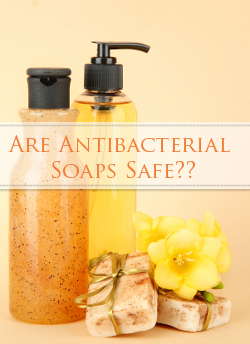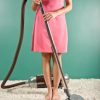 For many families antibacterial cleaners are a fixture in the home, whether they are in the form of hand soap or cleaners for your kitchen and bathroom. We are bombarded by marketing hype about the need for these products in sterilizing our homes and protecting them from harmful germs. But are these cleaners actually doing more harm than good?
For many families antibacterial cleaners are a fixture in the home, whether they are in the form of hand soap or cleaners for your kitchen and bathroom. We are bombarded by marketing hype about the need for these products in sterilizing our homes and protecting them from harmful germs. But are these cleaners actually doing more harm than good?
Why Do We Need to Kill Bacteria?
No one likes the idea of bacteria and germs laying in wait around our homes. We’ve been conditioned to think they are bad and that we must get rid of them to maintain health. It is true that some bacteria can cause disease, illness and food poisoning. And with that in mind it is easy to see why we gravitate towards a product, like antibacterial cleaners, that promise to kill around 99% of bacteria. After all, we all want to protect ourselves and our family from getting sick.
So Why Are Antibacterial Cleaners Bad for Our Health?
Many bad things happen when we try to get around nature’s design. Just look at how whole foods become unhealthy when we process and fragment them. Look at how a natural substance found in the earth can wreak havoc on the planet when processed as fuels and used to the extreme by the population. Antibacterial cleaners are not as good for us as they may initially seem. In the short term, their ingredients are known to irritate or even damage the skin (this is more of a problem with those that have been developed for cleaning purposes).
The FDA is currently looking into one of the major ingredients of antibacterial soaps: triclosan. Although the evidence isn’t cut and dry yet, it suggests it may have a harmful effect on humans and especially children. In the past, the FDA has also stated that there are no extra health benefits to using antibacterial soaps over regular soap and water. If there is no added benefit and the ingredients are even slightly suspect then why the use them?
A long term result of using antibacterial products is that they make bacteria more resistant. This means that, over time, these antibacterial products will no longer be able to kill the germs they set out to kill in the first place. We are essentially taking normal strains of bacteria and and giving the the means to get more powerful and potentially more harmful.
You simply don’t need to make your home sterile to protect yourself and your family. Bacteria is all around us, and being exposed to small amounts of it is what our body needs in order to build up its defenses against stronger bacteria. Studies have shown that sterile environments in childhood can actually lead to more allergies and other problems later in life.
The American Medical Associated (AMA) has warned against extensive use of such antibacterial cleaners for these reasons. When it comes to killing germs, simple measures like washing your hands often with traditional soap, is the best way to protect against germs… and the safest.
Instead of having a bottle of antibacterial soap next to the sink try a bar of Dr. Bronner’s Castile soap. For cleaning household surfaces the liquid version is amazingly effective. Combine that with a homemade disinfectant with vinegar, water, and tea tree oil mix in a spray bottle and you will be set. If you need a quirt bottle for meeting the demands of school supplies lists try Clean Well All Natural Antibacterial soaps. They have no triclosan.
Easy, safe, and green.



Very good article! I would add, also, that triclosan in the environment, when it rinses down the drain, harms aquatic wildlife, because our drains eventually empty into rivers, lakes, etc……
Cows
Great Article! As you stated, “the evidence is not cut and dry yet”. In my opinion, a great emphasis should be put on yet. In 1967, the EPA classified triclosan as a pesticide. Most all studies on triclosan have been done in extremely small quantities. But as Deb brought up, this stuff will eventually find its way into our streams and rivers in much larger quantities than those cut little handwash bottles. I am afraid to think of the results of killing all of God’s created “clean up crew”, bacteria, in our streams and rivers. :(
Are cool
Are cool
Pingback: Green Your Clean: Toxic Household Cleaners {Part 1} | A green living, green parenting blog